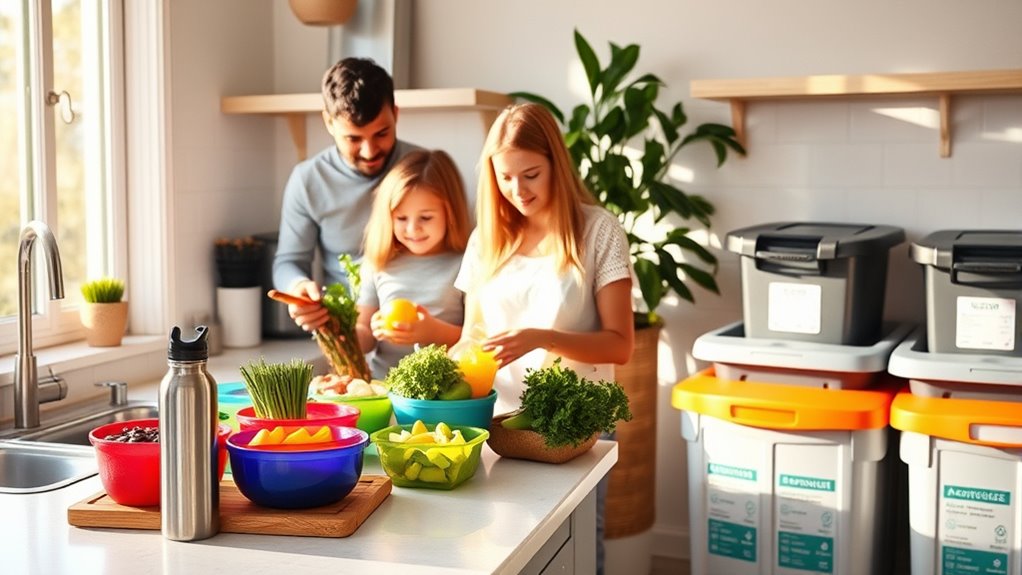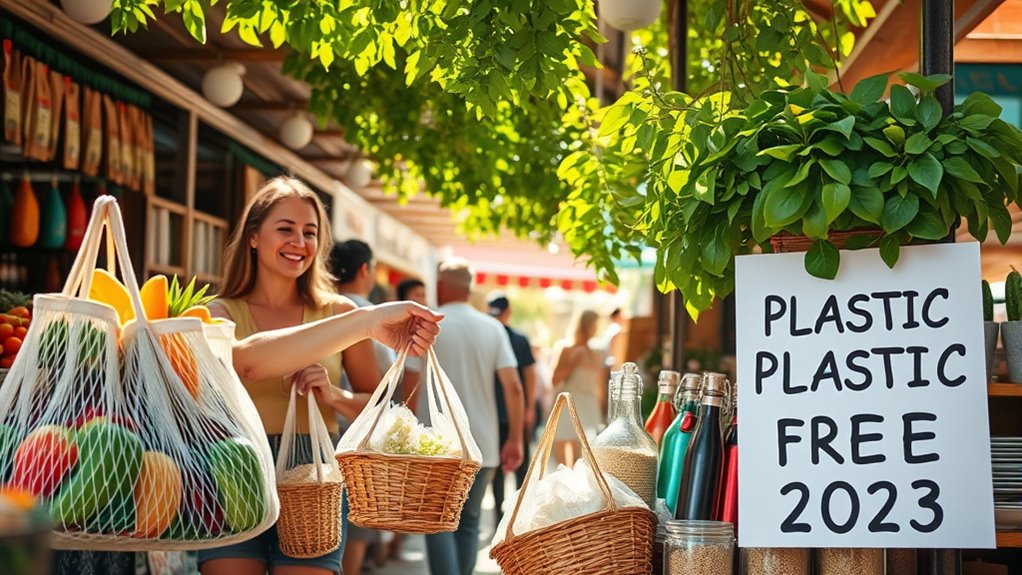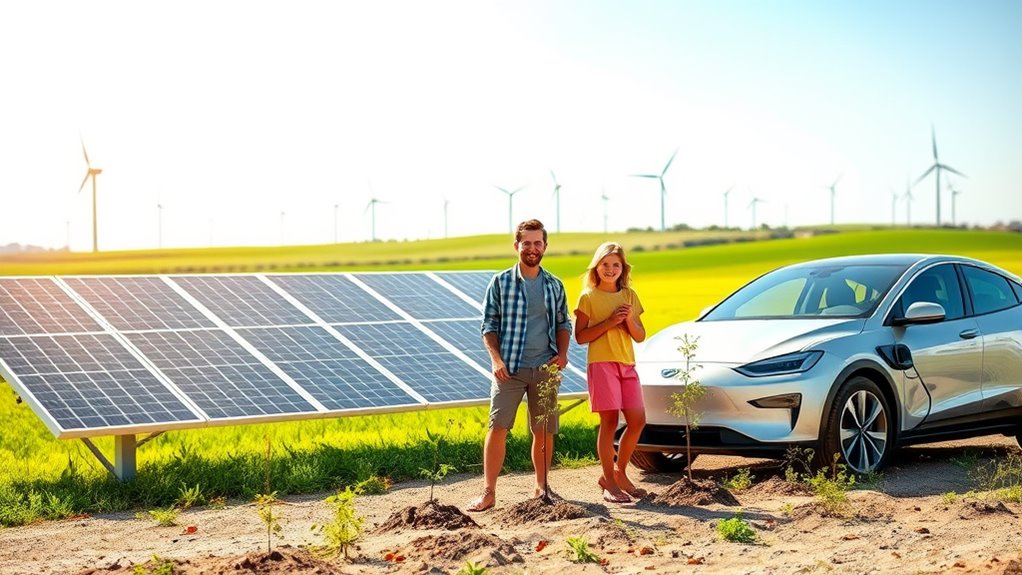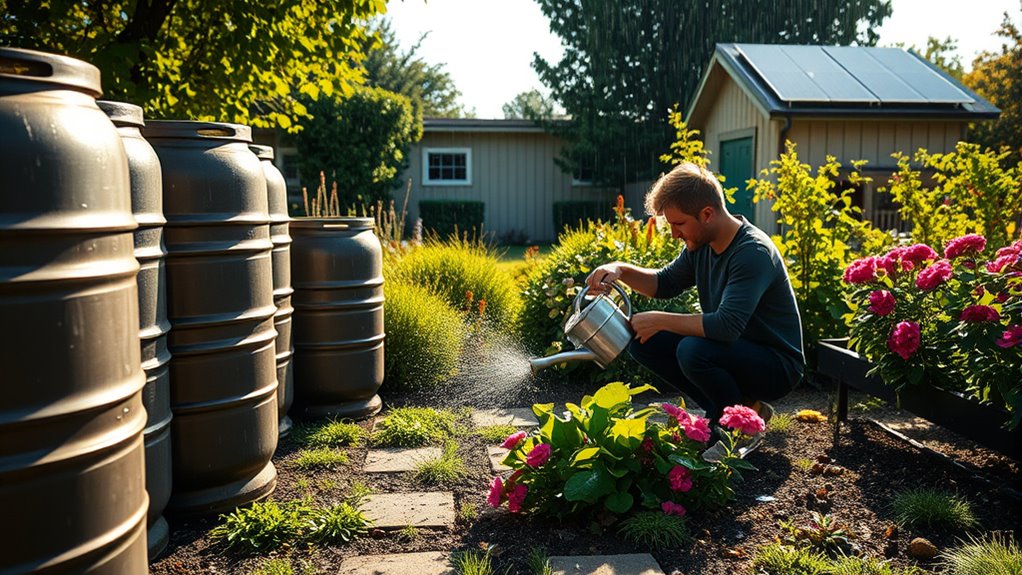In 2025, you can adopt eco-friendly habits like reducing single-use plastics by using reusable bags and containers. Embrace plant-based eating to lessen your carbon footprint and explore local markets for sustainable products. Opt for energy-efficient appliances to cut down on bills and support renewable energy sources. Don't forget to practice water conservation and consider composting to minimize waste. Discover more simple yet impactful changes that can enhance your sustainable lifestyle.
Key Takeaways
- Commit to reducing single-use plastics by using reusable bags, containers, and bottles in your daily life.
- Embrace a plant-based diet by incorporating more fruits, vegetables, and legumes into your meals for health and sustainability.
- Invest in energy-efficient appliances to lower utility bills and reduce your carbon footprint with advanced technology.
- Support local businesses and farmers' markets to strengthen the economy and minimize transportation emissions.
- Get creative with repurposing items and commit to proper recycling practices to keep waste out of landfills.
Reduce, Reuse, and Recycle

When you make a conscious effort to reduce, reuse, and recycle, you're not just helping the planet—you're also simplifying your life.
Start by evaluating what you really need. Cut down on single-use items like plastic bags and disposable cutlery. Instead, choose reusable options that save you money in the long run.
Evaluate your needs, reduce single-use items, and opt for reusable solutions that benefit both your wallet and the planet.
Next, get creative with what you already have. Repurposing old containers or clothing can spark innovative solutions while keeping waste out of landfills.
Finally, commit to recycling properly. Know your local guidelines and ensure you sort materials accurately. This way, you contribute to a circular economy where resources are valued.
Embracing these habits not only lightens your environmental footprint, but it also fosters a more organized and mindful lifestyle.
Embrace Plant-Based Eating

Adopting a plant-based diet not only benefits your health but also plays a significant role in reducing your environmental impact.
By choosing fruits, vegetables, whole grains, and legumes, you lower greenhouse gas emissions associated with meat production. Plus, this diet requires less water and land, making it a sustainable choice.
You don't have to go completely vegan to make a difference; simply incorporating more plant-based meals into your week can have positive effects.
Experiment with meatless recipes, explore new flavors, and discover how delicious plant-based eating can be. You'll likely find it easier to maintain a balanced diet while feeling energized.
Embrace this change, and enjoy both the health benefits and the satisfaction of contributing to a healthier planet.
Opt for Energy-Efficient Appliances

Opting for energy-efficient appliances not only saves you money on utility bills but also significantly reduces your carbon footprint.
When you choose appliances with high Energy Star ratings, you're making a smart investment in both your home and the environment. These appliances use less energy, which means lower electricity consumption and decreased greenhouse gas emissions.
Consider replacing old refrigerators, washing machines, and dishwashers with newer, more efficient models.
You'll notice the difference in performance and efficiency. Plus, many energy-efficient appliances come with advanced features that enhance convenience.
Shop Local and Sustainable

Supporting local businesses and choosing sustainable products can make a significant impact on your community and the environment.
When you shop local, you strengthen the economy, create jobs, and reduce transportation emissions. You'll find unique, handcrafted items that often have a smaller carbon footprint than mass-produced goods.
Look for farmers' markets, local artisans, and eco-friendly brands that prioritize sustainable practices.
Minimize Single-Use Plastics

Although single-use plastics are convenient, they contribute significantly to environmental pollution and waste. You can make a difference by adopting simple habits to minimize their use.
Start by carrying reusable bags when you shop, and choose glass or stainless steel containers for food storage. When you grab a drink, opt for a reusable water bottle instead of plastic ones. For coffee lovers, bring your own cup to cafés to avoid disposable ones.
You can also say no to plastic straws and utensils by using metal or bamboo alternatives. By making these small changes, you'll not only reduce your plastic footprint but also inspire others to follow suit.
Every effort counts in creating a cleaner, healthier planet for future generations.
Support Renewable Energy Sources

Shifting away from single-use plastics is just one way to protect the environment; another impactful choice is to support renewable energy sources.
You can start by choosing green energy options from your utility provider, such as solar or wind power. If possible, consider installing solar panels on your home, which can significantly reduce your carbon footprint.
Supporting local renewable energy projects not only benefits the environment but also stimulates your community's economy. You might also advocate for policies that promote clean energy initiatives.
By reducing reliance on fossil fuels, you're actively contributing to a sustainable future. Every action counts, so make informed decisions that align with your values.
Together, these efforts can lead to a cleaner, greener planet for generations to come.
Practice Water Conservation

While it might seem like water is an endless resource, practicing water conservation is crucial for preserving our planet's ecosystems.
Practicing water conservation is essential for protecting our planet's ecosystems, despite the illusion of endless supply.
You can start by fixing leaks in your home; even a small drip can waste gallons over time. When showering, aim to keep it under five minutes and turn off the tap while brushing your teeth.
Consider using a broom instead of a hose to clean driveways and sidewalks. Collect rainwater for watering your garden or indoor plants.
If you have a lawn, choose drought-resistant plants that require less water. Lastly, be mindful of your water usage in daily chores like laundry and dishwashing.
Every small change you make can lead to significant water savings, benefiting both you and the environment.
Use Public Transport or Carpool

When you choose to use public transport or carpool, you're not just making your commute easier; you're also significantly reducing your carbon footprint.
By sharing rides with others or hopping on a bus or train, you cut down on the number of vehicles on the road, leading to less traffic congestion and lower emissions.
Plus, you can save money on fuel and parking fees while enjoying a more relaxed journey. Public transport often provides a chance to read or catch up on podcasts, turning your travel time into productive moments.
Carpooling fosters community, allowing you to connect with others and build friendships while being eco-conscious.
Embrace these options to make a positive impact today!
Create a Home Composting System

Another impactful way to contribute to a healthier planet is by creating a home composting system.
Start by choosing a compost bin that fits your space, whether it's a simple pile in the backyard or a contained bin on your balcony. Gather kitchen scraps like fruit peels, vegetable trimmings, and coffee grounds, and mix them with yard waste such as leaves and grass clippings.
Keep the compost aerated by turning it regularly, and monitor moisture levels to ensure it doesn't dry out. In a few months, you'll have nutrient-rich compost ready to enrich your garden soil.
Not only will this reduce waste, but it'll also minimize your carbon footprint while promoting sustainable gardening habits.
Start composting today!
Frequently Asked Questions
How Can I Encourage Others to Adopt Eco-Friendly Habits?
To encourage others to adopt eco-friendly habits, start by leading by example. Show how easy it's to make small changes, like using reusable bags or reducing waste.
Share your experiences and the positive impact these habits have on the environment. Engage your friends in discussions about sustainability and invite them to participate in local eco-friendly events.
Celebrate their efforts, no matter how small, to create a supportive community focused on making a difference together.
What Are the Financial Benefits of Going Green?
Going green can save you money in several ways. By reducing energy consumption, you'll see lower utility bills.
Investing in energy-efficient appliances can lead to long-term savings, too. Plus, using public transport or biking cuts down on fuel costs.
Many eco-friendly practices, like growing your own food, can lower grocery bills. You'll also find that some governments offer tax incentives for green initiatives, giving your wallet an extra boost while helping the planet.
How Do I Measure My Carbon Footprint?
Measuring your carbon footprint is like tracking your shadow on a sunny day—it reveals how much you're impacting the environment.
Start by calculating your energy consumption at home, including electricity, gas, and water usage.
Next, consider your travel habits, such as car mileage and flight frequency.
Online calculators can help you compile all this data, giving you a clearer picture of your emissions and areas where you can improve for a greener future.
Are There Eco-Friendly Products for Personal Care?
Absolutely, there are plenty of eco-friendly products for personal care! You can find organic shampoos, biodegradable toothpaste, and natural deodorants made from sustainable ingredients.
Look for brands that prioritize minimal packaging and cruelty-free practices. Switching to reusable cotton rounds or bamboo toothbrushes can also make a difference.
What Are the Latest Innovations in Sustainable Technology?
Have you ever wondered how technology can actually save the planet? The latest innovations in sustainable technology are transforming industries and daily life.
You'll find breakthroughs like solar panels that double as windows, biodegradable electronics, and energy-efficient appliances that drastically cut energy consumption.
Companies are also harnessing AI to optimize resource use. By exploring these advancements, you can actively contribute to a greener future while benefiting from smarter, more efficient solutions.
Conclusion
As you step into 2025, picture a world where vibrant green spaces flourish and clean air fills your lungs. By adopting these eco-friendly habits, you're not just making small changes; you're planting seeds for a healthier planet. Imagine savoring fresh, locally sourced meals, feeling the warmth of the sun on your back as you bike to work, and knowing you're part of a community that cares. Together, let's nurture our Earth and create a brighter, sustainable future.









